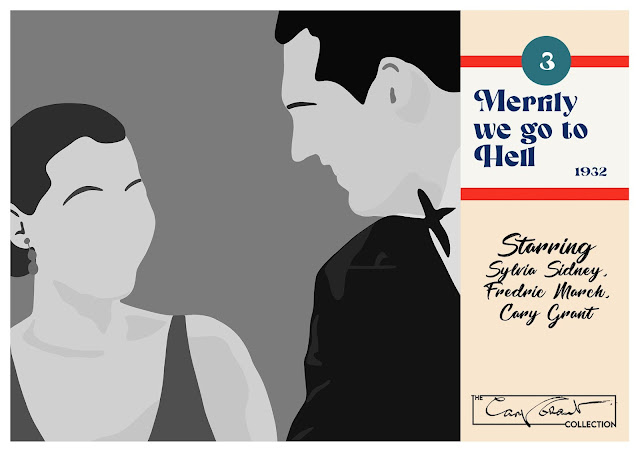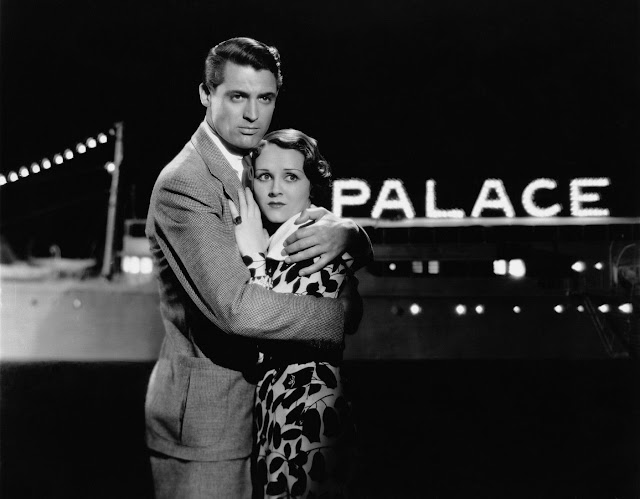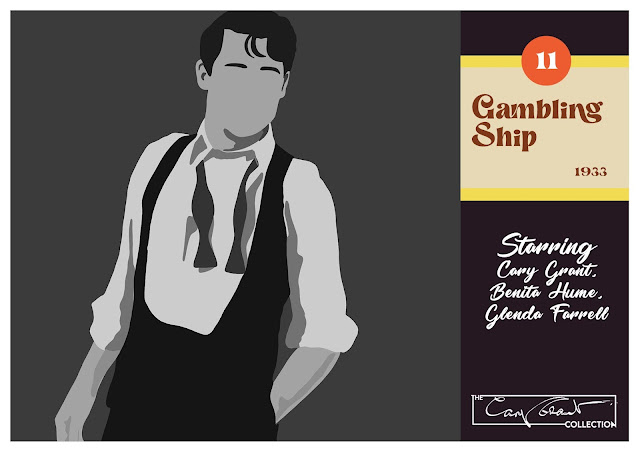"...a brief treat among the supporting players though, in the shape of Cary Grant..."
 |
| With Sylvia Sidney and Fredric March. |
Merrily We Go To Hell:
"Merrily We Go To Hell focuses on the turbulent relationship between Joan Prentice (Sylvia Sidney) and Jerry Corbett (Arzner regular Fredric March). They first meet at a party, where Jerry is drunk but charming and they arrange a dinner date, which Jerry is late for but eventually attends.
Though Jerry’s drunken antics cause concern for Joan, she’s too smitten by him to give up. After they marry, he becomes much better behaved, though they have financial worries whilst he struggles to make a name for himself as a playwright. When Jerry does get a play sold, it stars his old flame, Claire Hempstead (Adrianne Allen), and this reunion knocks him off the wagon. He also starts to get romantically involved with Claire again, barely hiding it from Joan in his frequently drunken state.
Joan attempts to stand fast and keep Jerry on the straight and narrow but eventually has enough and attempts to show her husband what pain he’s causing by living a wild and free life herself.
Merrily We Go To Hell has quite an unusual tone. From the title and blurb I’d read, I was expecting a riotous screwball comedy. However, though there is plenty of comedy in the film, it’s countered by quite serious drama. It’s very much a film of two halves in fact, with the first leaning more heavily towards romantic comedy, then the second skewing much closer to drama, ending on a particularly moving note of tragedy. In the wrong hands, this shift in tone might have been a problem, but Arzner keeps the transition smooth and natural. In fact, it helps strengthen the depiction of the problems the central relationship faces, with Jerry’s alcoholism seeming charming to begin with, before becoming destructive. This mixture of warmth and comedy with cold cynicism makes for a deep and believable depiction of marriage too.
Also helping sell the concept are a pair of great central performances. March plays drunk very well and has enough charisma to prevent his character’s many flaws from turning the audience completely away from him. Sidney is the real star of the show though. Her richly textured performance feels way ahead of its time, with subtle changes in expression belying her breezy, cheerful demeanour. The wedding scene is a particularly strong moment between the pair as their body language and reactions make for a wonderfully awkward atmosphere and add great depth to a scene that’s very straightforward on paper.
The rest of the cast are a bit of a mixed bag, with George Irving a little flat as Joan’s father, for instance, whereas Richard ‘Skeets’ Gallagher is enjoyable as Jerry’s drunken cohort, Buck. There’s a brief treat among the supporting players though, in the shape of Cary Grant, who features in a very early role.
The script can be a bit hit and miss too. There are some amusingly witty lines but it’s not as sharply written overall as some other classic comedies from the era. The story also ladles on the melodrama towards the end with a final scene that ties things up too simply for my liking.
Visually, Arzner and DOP David Abel do a great job. There’s plenty of camera movement that’s only subtly used for the most part, though there are a couple of quite complicated tracking shots in there too. There’s also a nice use of depth in frame, to keep the film visually interesting.
I didn’t feel the pace was well maintained though. Perhaps it’s because I was expecting more of a screwball comedy, or it’s due to the quieter nature of the early sound era, but the film didn’t feel as ‘punchy’ as it could be.
Overall, however, Merrily We Go To Hell is a sensitive, yet frank and honest examination of a troubled marriage. Its move from comedy to tragedy was unexpected for me and made for an unusual blend, but the transition is well handled. The film isn’t perfect and has some lulls here and there, but some fantastic central performances and assured, intuitive direction make it something special, regardless."
- David Brook, BlueprintReview.co.uk, 5 June 2021
 |
New Artwork by Rebekah Hawley at Studio36 -
Number 3 - Merrily We Go To Hell (Lobby Card Style) |
Part Of

For more, see also:
On This Day 10 June 2020
On This Day 09 June 2021
Quote From Today 10 June 2022




































